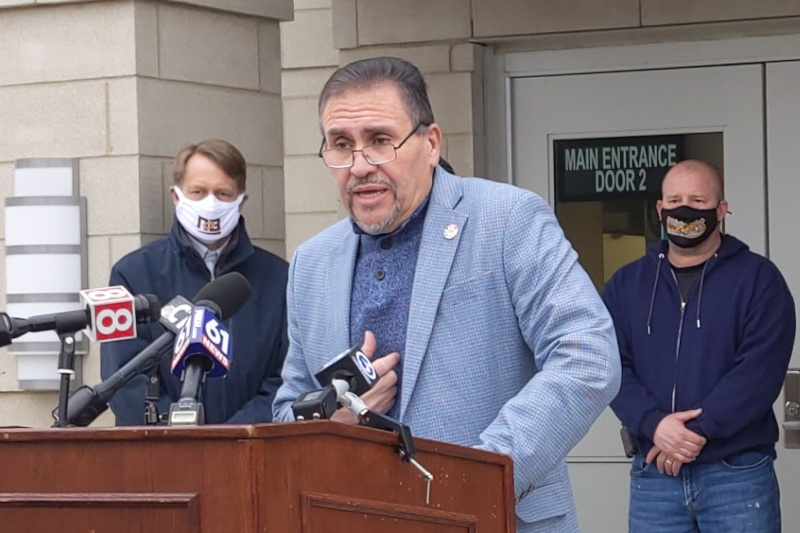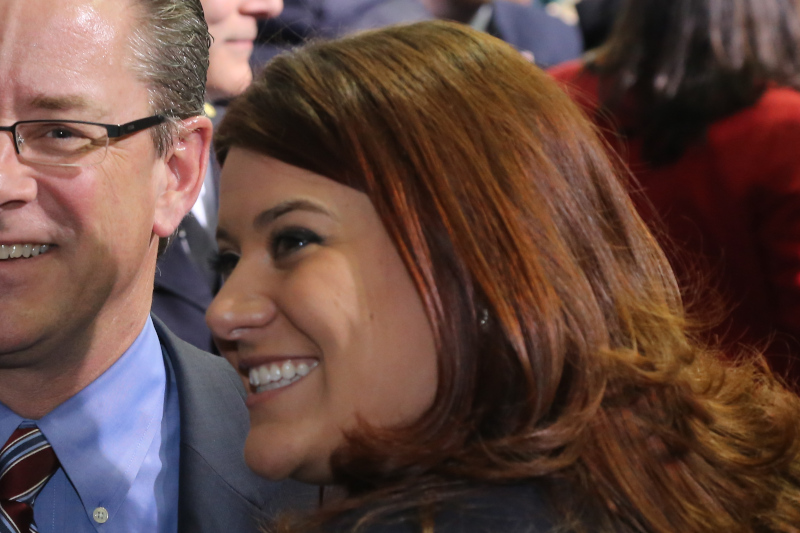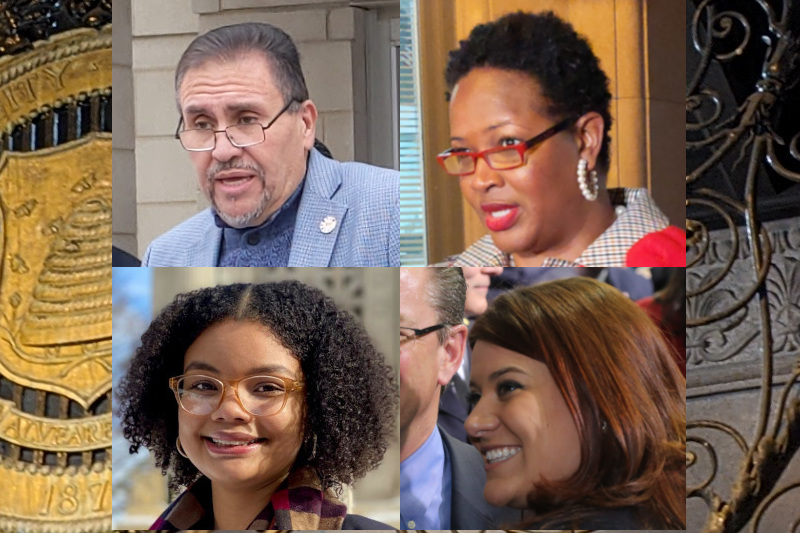New Britain’s field of at least four declared and potential 2021 candidates for Mayor are nearing the critical March 31st fundraising deadline. The report filed after that deadline, by April 12th, is often seen as an early sign of campaign strength and organization.
In campaign finance reports, required under state law, all political committees are required to publicly disclose contributions and expenditures made. They are required in January, April, July and October, plus additional reports are required of candidates seven days before elections and primaries and 30 days after primaries.
But the timing of the April 10th report, which includes contributions and expenditures made up to March 31st is at a critical moment in an election year, when strong candidates are preparing to wage robust campaigns through the spring and summer. While the reports only include money raised and spent, and are not necessarily a sign of the public support for different candidates, they often are seen as a sign of the level of organization and support different candidates have.
For the three declared and potential Democratic candidates for Mayor, this filing is likely to be seen as especially important. Democratic activists often commit support to one candidate or another after waiting to see which candidates appear to have shown that they can win. Early fundraising is often looked to as a benchmark, especially if the field of candidates is large.

Democratic Rep. Bobby Sanchez (D-25) has gained considerable support, as he explores a Mayoral campaign. Senator Rick Lopes (D-6), Rep. Peter Tercyak (D-26), Rep. Manny Sanchez (D-24) and the Democratic City Council leader, Ald. Francisco Santiago (D-5), have all announced they they are backing the Twenty-Fifth District State Representative to be elected as Mayor in the 2021 elections this year.
Rep. Sanchez very publicly criticized incumbent Republican Mayor Erin Stewart when she doubled-down recently on her longstanding policy of flat-funding the city’s schools. Stewart has been widely criticized for comments she made during her most recent “state of the city” speech that, “what I will not do is blindly throw additional tax dollars into a massive bureaucracy that is failing our students.” Rep. Sanchez lead a public challenge to Stewart’s comments and called for increasing the city’s funding for the schools’ annual budgets.
Rep. Sanchez is currently Chair of the powerful legislative Education Committee, his second term in that important position. Advocates for Sanchez frequently laud his work in supporting funding for New Britain schools, early childhood education and public education, in general. He has been named as a “Children’s Champion” by the Connecticut Early Childhood Alliance.
Sanchez’ official biography has said that he, “is a longtime leader in the New Britain community. Before joining the state legislature, he served on the New Britain Board of Education, where he was a strong voice for quality education and efficient administration.”
“From my time as a teacher, to my work at HRA, to serving as a state representative,” Rep. Sanchez has said, “I have seen how this city has changed over the years and I know that we can get New Britain on a better path forward under the right leadership.”

Community and Democratic leader Veronica T. DeLandro has also been building a campaign with momentum after officially announcing that she was exploring candidacy for Mayor. DeLandro has been been doing a “listening tour” of different constituencies in the city, including businesses, CCSU students, faith-based leaders and parents.
This month, DeLandro has been organizing a “Vaccine Hesitancy Campaign,” in which her campaign said that she and volunteers would, “visit various neighborhoods throughout the city and talk to residents about the importance of getting the Covid-19 vaccine, while providing them with specific information on where they can schedule an appointment and noting who is eligible.”
At the beginning of March, DeLandro had announced that that she had raised $20,000 in the first month of her possible run for Mayor, and has since said that her campaign has raised $30,000.
DeLandro has served as District Director for Congresswoman Jahana Hayes (D-5) and now provides consulting, training and coaching to nonprofit organizations at VTD Consulting Group, which she founded. She previously had a career at ESPN before she began working with organizations with a focus on philanthropy, college access and mentoring.
DeLandro ran for City Council in 2017, very nearly winning an upset victory in an uphill race in the City’s First Ward, where Republicans have historically had the advantage in city level elections, and then was selected as the City Council’s first woman and first African American Clerk of Committees. She has also previously served on the city’s Youth & Family Services Commission and the school system’s Graduation Odyssey Task Force.
DeLandro’s stature as a leader in the community and among Democratic Party activists has grown, advocates for her have noted, because more attention has been focused on what are widely viewed as her substantial qualifications and leadership capabilities, ironically, because city Republicans’ blocked her from a seat on the Council, selecting a loyalist of the Stewart-Republican political machine, instead.

Political activist and Democratic candidate Alicia Hernandez Strong has already taken the step of announcing that she is officially running for Mayor. The candidate had earlier announced that she was exploring candidacy, but was the first of the Democratic field to make it official.
Strong has said that she, “running on a working class platform,” saying, ”My priority is working people. I am fighting for working people because I believe that our students deserve a well-funded, quality education in this town.” She called for affordable housing and a police civilian review board with subpoena power, “in which the police will be accountable to all of the residents of New Britain.”
“The fact of the matter is,” Strong has said, “if we truly want to transform this city, we need bold change.” Strong has said that Republicans in office want to keep the status quo, “and even some of the establishment Democrats are afraid of too much change.”
Strong is a co-founder of the New Britain Racial Justice Coalition, and was its President until she began exploring a run for Mayor. The Coalition was born out of the 2020 summer of protest that has demanded equity and changes to end systemic racism and violence in response to a long history of police violence in the nation against People of Color.
The Racial justice coalition led the effort to press the city to remove the Christopher Columbus from the public parkland at the corner of Main and North streets. It pressed for the approval of the state’s new police accountability law and for the approval of a community police review board by the City Council. After a number of these priority were pushed aside, including when Council Republicans voted down a strong community police review board, Stewart vetoed the Columbus statute removal, Council Republicans voted to uphold that veto and then Council Republicans voted down DeLandro’s appointment to a Democratic vacancy on the City Council, racial justice advocates began turning their attention to the 2021 city elections to bring change.

While Democrats vie to show the strength of their relative campaigns, Stewart, the incumbent Republican Mayor, faces a different challenge of expectations, with the March 31st fundraising deadline.
Few were surprised when Stewart announced her candidacy for a fifth term of office. She is already one of the longest serving mayors in New Britain’s history, as she looks to extend her tenure to a decade. Most observers view the Republican Mayor has having the early advantage among the field of candidates.
Stewart is frequently seen as effectively exploiting the powers of incumbency and City Hall to significant political advantage. With that power, Stewart has repeatedly eluded political consequences to her own re-elections of unpopular policies and politics of her administration, including low funding for the city’s schools, higher property taxes, increased City Hall spending, floating city annual budgets with long-term taxpayer debt, the failed attempt to allow mining on public watershed land and what many view as the generally uncouth brand of the politics of her political machine.
But the powers of Stewart’s incumbency and the strength of the Stewart-Republican political machine bring higher expectations on her in the upcoming campaign finance report than on her potential Democratic challengers. Few are likely to be surprised if Stewart has raised considerably more money than the field of Democratic candidates. Eyebrows will likely only be raised if she does not.
While Stewart is expected to be the Republican nominee with no opposition from her own Republican Party, the Democratic nomination would be decided by everyday Democratic voters in a September 14th primary if two or more candidates vie for the nomination past the Democratic Party endorsements.
Nominations by the Democratic Party are a potentially two step process. The Democratic Party’s governing Town Committee makes endorsements of candidates for city offices in July. If there is no primary, the Town Committee’s choice becomes the nominee of the Democratic Party. But, candidates not endorsed by the Town Committee can send the decision on the nomination to a Democratic primary by collecting petition signatures.
In a multi-candidate field, the April 12th fundraising report is often viewed as one important benchmark of each candidates’ viability to undertake a primary campaign and the November general election.
When the campaign finance reports are filed, political observers generally look, not just to how much each candidate has raised in contributions, but also how much has been spent. In practical terms, the amount of money left, between contributions and spending, often called “cash-on-hand”, is also commonly seen as important. Since most campaign spending is done late in the election season, campaigns look to build large “war chests” ahead of the toughest, most expensive parts of the campaign.
Another fact frequently looked to in campaign fundraising reports is the number of contributors. Particularly for Democrats, but for many Republicans, as well, showing a larger number of smaller contributors, is often seen as a sign of organizational strength and is frequency read as an early benchmark for a candidate’s breadth of support.
While the deadline for filing the reports for the campaign fundraising period ending March 31st is not until April 12th, it is also not uncommon for candidates to release their fundraising totals early. That is particularly true when a candidate believes that their report shows momentum for their campaign.




